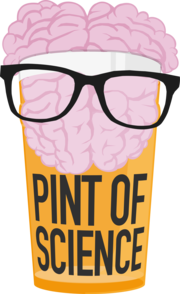Pint of Science 2023
CEPLAS scientists participate in international science communication festival
Same as in recent years, CEPLAS researchers participate also in 2023 in the international science communication festival "Pint of Science".
We are looking forward to our on-site events in Cologne and Düsseldorf!
Registration and ticket required!
Here are our contributions:
May 22, 2023, Kassette Düsseldorf
- Franziska Fichtner
Können auch Pflanzen Diabetes bekommen?
Um optimal wachsen zu können, müssen Pflanzen wissen, wie viele Ressourcen ihnen zu Verfügung stehen. Gerade die Menge an Zuckern, die Pflanzen zum Wachsen brauchen, spielt hierbei eine wichtige Rolle. Pflanzen haben, ähnlich wie Menschen, einen Insulin-ähnlichen Signalstoff, der ihnen sagt, wie viel Zucker sie zur Verfügung haben und der, wenn seine Herstellungen nicht optimal reguliert wird, sie zu Diabetikern werden lassen kann. Was das für die Pflanze bedeutet und warum es so wichtig ist diesen Signalstoff zu untersuchen, erfahren Sie beim Pint of Science.
- Christian-Frederic Kaiser
Don’t Panic! Answers to the ultimate questions of plant breeding, the universe and everything
Machen wir uns auf eine Reise durch das Universum der Pflanzenzüchtung von ihren Ursprüngen in die Zukunft. Wie revolutionierte Züchtung unsere Welt? Wie kam es zu der bunten Vielfalt der wir im Supermarkt begegnen?! Wie geben wir Pflanzen, dass Update für die Zukunft, um Klimawandel, Hunger und Krankheiten zu widerstehen?
- Sebastian Triesch
Was haben ein Motor, eine Ananas und ein Bier gemeinsam
Warum wir uns die Photosynthese wie einen kaputten Motor vorstellen können und was eine Ananas damit zu tun hat, müssen die Gäste dann herausfinden, wenn sie zur Veranstaltung kommen
May 22, 2023, Liebefeld zu Ehren, Köln
- Laura Merx
How bacteria can help us feed the world
Corn is an essential food crop that is very important all around the world. To grow it, farmers need soil that has lots of nutrients, like nitrogen. But plants can't use atmospheric nitrogen, so they either get it from the soil on their own or they benefit from microorganisms like bacteria. In this talk, we will learn about how microorganisms can help plants grow by providing them with nitrogen. We will also discuss how scientists study these microorganisms and their interactions with plants, so we can better understand how they work together to help our food grow.
- Philipp Katzy
The daily portion of Aspirin – Plant immunity and Painkiller
The precursor of Aspirin is Salicylic acid. This chemical is found in plants and helps them to fight off diseases caused by fungi, bacteria, and viruses by activating the plant's immune system which includes changes in gene expression and production of special molecules that help fight off the harmful invaders. Interestingly, the same chemical that helps plants to defend themselves can also relieve pain in humans. In fact, salicylic acid was first extracted from willow bark in the early 1800s and eventually turned into a medicine we know today as aspirin.
May 23, 2023, Bumann und Sohn, Köln
- Shrihari Negi
Microbes for water treatment- a song of engineering and evolution
Have you ever wondered how safe the water we drink really is? Even in the cleanest waters, tiny substances called 'micro-pollutants' can sneak in, including antibiotics and hormones. Even small amounts of these can harm the environment and public health. What if we used nature to help us solve this problem? By engineering the ancient relationship between microalgae and bacteria, we may find new ways to keep our water clean. Join us for a short talk about the story of a team which tried to address this challenge, narrated through songs and snippets of science!
May 24, 2023, Tankstelle, Köln
- Dr. Craig Dent
Respect your elders: Tracing the lineage of the potato
Over the past two centuries, potato breeding in Europe has led to a lot of inbreeding resulting in some old types of potatoes which contributed their DNA many times to the modern potatoes we eat today. This project aims to identify these old potato types and figure out how many of them we need to capture all the genetic information in modern European potatoes. We do this by using a breeding pedigree of European potatoes and simulating how DNA passes from one generation to the next. By doing this, we hope to better understand the genetic makeup of modern potatoes and improve future breeding.
More information on the talks, locations, detailed schedule and ticket sale on the Pint of Science Website
